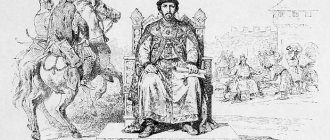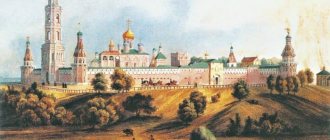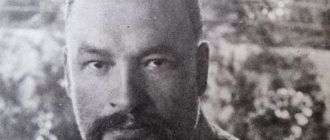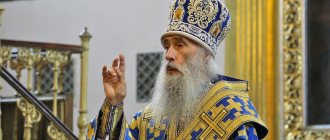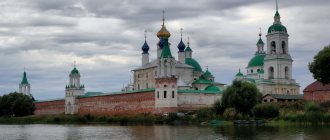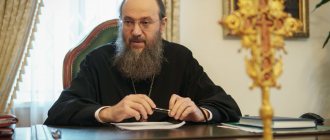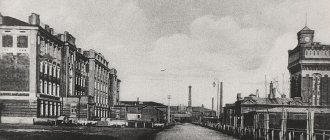Russian Orthodox Church
Born on September 25, 1972 in the Moscow region into a family of military engineers. Baptized in infancy.
In 1989, he graduated from the 10th grade of the Meshcherinsky secondary school (Stupinsky district, Moscow region) and entered the Moscow Aviation Institute. In 1995 he defended his diploma in the specialty “Computers, systems, complexes and networks.” He worked in his specialty at the Central Research Radio Engineering Institute named after. Axel Berg from 1990 to 2004
Since 1995, he served as an altar boy at the Church of St. Nicholas of Myra in Pyzhi, Moscow. At the same time, he entered the Orthodox St. Tikhon’s Theological Institute as a correspondence student.
On March 15, 2004, in the Nikolo-Solbinsky Monastery, Archbishop Kirill of Yaroslavl and Rostov ordained him to the rank of deacon, and on July 12, 2004, to the rank of priest.
From November 22, 2004 to November 12, 2012 - rector of the Church of the Nativity of the Virgin Mary. Velikoye, Yaroslavl region. From October 10, 2009 to November 12, 2012 - rector of the Sretensky Church in Yaroslavl. From April 23, 2007 to November 12, 2012 - confessor of the Yaroslavl provincial gymnasium named after. St. Ignatius Brianchaninova and head of the department of religious education and catechesis of the Yaroslavl diocese.
In November 2012 he was transferred to the clergy of the Yekaterinburg diocese.
From December 7, 2012 to October 14, 2014 - rector of the Greater Chrysostom Church in Yekaterinburg. From December 2, 2012 to March 24, 2015 - Chairman of the Department of Religious Education and Catechesis of the Yekaterinburg Diocese. Since December 28, 2012 - dean of the Ivanovo district of Yekaterinburg. Since October 14, 2014 - rector of the Voznesensky bishop's metochion. Since March 15, 2015 - first assistant to the ruling bishop of the Yekaterinburg diocese.
In 2014 he defended his diploma at the Yekaterinburg Theological Seminary.
Master's student in the Department of Pedagogy of the Church Postgraduate and Doctoral Studies at the Russian Christian Humanitarian Academy in St. Petersburg.
By the decision of the Holy Synod of July 15, 2016 (magazine No. 50), he was elected vicar of the Yekaterinburg diocese with the title “Middle Ural”.
July 16, 2016 in the temple of rights. Simeon of Verkhoturye in Yekaterinburg, Metropolitan Kirill of Yekaterinburg and Verkhoturye was tonsured a monk with the name Eugene in honor of the passion-bearer Eugene (Botkin).
On July 17, 2016, at the all-night vigil in the Trinity-Sergius Lavra, His Holiness Patriarch Kirill of Moscow and All Rus' elevated him to the rank of archimandrite.
He was named bishop on July 17, 2016 in the Throne Hall of the Patriarchal Chambers of the Trinity-Sergius Lavra. Consecrated on August 1 during the Liturgy at the Holy Trinity Seraphim-Diveevsky Monastery. The services were led by His Holiness Patriarch Kirill.
By the decision of the Holy Synod of May 14, 2022 (magazine No. 21), he was appointed Bishop of Nizhny Tagil and Nevyansk.
By the decision of the Holy Synod of March 11, 2022 (journal No. 24), he was appointed to the position of deputy chairman of the Synodal Department of Religious Education and Catechesis.
By the decision of the Holy Synod of August 25, 2022 (journal No. 53), he was appointed vicar of His Holiness the Patriarch of Moscow and All Rus' with the title “Bronnitsky”, vicar of the Don Stavropegic Monastery; also appointed chairman of the Synodal Department of Religious Education and Catechesis (Journal No. 54).
By the decision of the Holy Synod of December 8, 2022 (magazine No. 93), he was appointed by the Eminence of Yekaterinburg and Verkhoturye, head of the Yekaterinburg Metropolis, with the dismissal of the post of vicar of the Donskoy Monastery and the retention of the post of chairman of the Synodal Department of Religious Education and Catechesis.
December 25, 2022 His Holiness Patriarch Kirill elevated him to the rank of metropolitan.
Member of the Supreme Church Council of the Russian Orthodox Church.
Bishop Eugene (Kulberg): “Touch the secret of life...”
It would seem that only last year the Nizhny Tagil diocese was headed by Bishop Eugene, but in such a short period of time, the parishioners of the Salda churches managed to love the young bishop with all their hearts. While attending the service, listening to the Vladyka’s holiday sermons, you involuntarily catch yourself thinking: Bishop Eugene is gifted with the charm of a man of God, a special warmth comes from him, warming all believers with his love.
– Vladyka Evgeniy, it is known that you received a secular education (MAI) and your profession was very in demand and popular - systems engineer (probably more understandable for readers - programmer), but after working for a certain time in your specialty, you still chose the path and calling to serve God. How did your path to Christ begin?
– It’s unlikely that anyone will be able to say reliably when his path to Christ began... When I studied at the institute, we had very interesting subjects, including those related to expert systems and developments in the field of artificial intelligence. And the luminary of science, Professor Vladimir Aleksandrovich Ilyin, told us: “Dear young people! We are studying such lofty things, but remember once and for all: there is no artificial intelligence in the world and there never will be. True intelligence is only in man, and so is reason.” And it was interesting for me to think about where a person’s intelligence comes from, what is the source of this intelligence, and naturally, the thoughts reached some higher mind. And when the elder brother brought the Gospel and told me about the Orthodox doctrine, everything immediately fell into place, and the need for artificial intelligence and higher intelligence disappeared, because the Orthodox doctrine revealed that God is the source of reason, He himself is Reason, and there is no need to invent any prosthetics in the form of artificial intelligence instead.
– Who influenced the formation of your personality as a shepherd and now a bishop?
- A lot of people. This is the first priest to whom I once came for confession, and who, thank God, is still alive to this day. And many parishioners of those wonderful churches where I went to services. In addition, there were wonderful books, of which there are still many in Orthodox shops.
– How did your parents react to the fact that you decided to devote your life to Christian service?
“My parents had not been churchgoers since childhood, and this was not very clear to them. But they treated me with great respect and did some of the work with me, for which I am very grateful to them. They took on the everyday burdens so that I had the opportunity to fully devote myself to priestly service.
– It is clear that the Bible and the Gospel are the main books of life. Do you have any favorite works of patristic literature?
- Certainly. For example, already in the nineties, which coincided with the beginning of my Christian path, many wonderful books were published. I remember the book by Sergius Nilus “On the Bank of God’s River,” a wonderful work about the life of the Optina ascetics. Or - “Description of the Seraphim-Diveevo Monastery”, this is a book compiled by the holy martyr Seraphim Chichagov, it is dedicated to the Venerable Seraphim of Sarov. Or - an amazing book about the new martyrs of Optina, “Red Easter,” which became a striking phenomenon of its time. And from the patristic books, the works of the Serbian saint Nikolai Velimirovich are very close to me. The list could go on for a long time.
– The Assumption Fast ended recently, it is the shortest of all the Fasts. What could we have done in such a short period for our spiritual growth?
– In spiritual life, as, for example, in sports, there are different types of exercises. For example, marathon and sprinting. They differ significantly from each other, and a person cannot do both at the same time. In spiritual life, the marathon is Lent, and there is such a short distance, but absolutely bright, like the Dormition Fast, it lasts only two weeks. It is dedicated to the Dormition of the Mother of God, and it is important to have time to read the legend about Her life, read the akathist to the Mother of God, Her Dormition. Or you can go through this Lent by praying absolutely wonderful short prayers that are dedicated to the Most Holy Theotokos. And all this allows, in the short time of the Dormition Fast, to touch the mystery of the life, purity and resurrection of the Most Holy Theotokos. This is the most important thing to do.
– I talked with a religious woman, she complained that her legs have been hurting lately and it can be difficult to stand the Liturgy, there are not many benches, and even if there are, they are occupied by people older than her. In Cyprus, there are enough benches in churches for all parishioners, and here in Russia, in some rural parishes, there are a lot of “seats” and the vast majority sit during the service (of course, except for the most important moments of the Liturgy). Apparently, this question has been raised before, because there is a well-known expression by St. Philaret of Moscow “it is better to think about God while sitting than to think about your feet while standing.” Perhaps, on holidays and Sundays, churches should add benches for worship?
“I know that if the priest in the church cares about his parishioners, then he tries to make sure that there is a bench for every person who is having a hard time.” In the Russian Orthodox tradition, there is no such practice that the entire church is filled with benches, as is the case in the East. But nevertheless, there are always benches in the church, and if it’s hard for you, and there aren’t enough of them, it makes sense to approach the priest and tell about it. And he will definitely help. And if this suddenly does not happen, you need to look for a parish where there is a bench for you. This is an expression of love for one another: helping to bear one another's weaknesses. Some parishioners carry folding chairs with them, if possible, some even leave them in the vestibule. And some parishioners, for example, always look around and look for a person who is having a hard time, and invite him to sit on a bench - as happens on a bus.
– Vladyka, what is the most important thing in the life of a Christian? And how to come to faith?
– The most important thing in the life of a Christian is to believe in the Resurrection of Christ and that we ourselves will be resurrected. And from such a height look at everything that happens around. Coming to faith is always a call from God. The Lord often calls every person to faith, but we hear this poorly, not everyone listens. To come to faith, you need to try to hear this call of the Lord, which comes through various events and circumstances. For example, the Lord called the Apostles as fishermen and said: “Follow me, you will be fishers of men.” And to the Apostle Matthew, the tax collector, He said: “Leave your taxes and follow Me.” Or take the thief nailed to the cross. The Lord saw his repentance and said: “Today you will be with Me in Paradise.” The Lord calls everyone in his own way: some through illness, others through a sufficiently well-fed life. One person learns to tolerate illness, another learns to be grateful for everything that exists. To come to faith, it is important to stop resisting God's calls. Or you can start small - come to church with a sincere impulse. And there the Lord will call. Jesus Christ said to his Apostles: “You did not choose Me, but I chose you.”
– The work of a journalist involves obtaining information, both positive and negative. How to console the readers of our newspaper about various reforms, the same - garbage, pensions - they are already a fait accompli.
– Unfortunately, today, after many years of atheistic propaganda, the spiritual component that protected him from all adversity has disappeared from a person’s life. Imagine: a bus is driving along a rough road. Between the road and the passenger sitting in it, there are soft wheels and elastic shock absorbers that smooth out the roughness of the road, preventing every bump and every stone from shaking this bus so that it jumps. Likewise, spiritual life for a person is a gift from God, which softens the blows that life presents to a person. If he lives without the help of God, without the life of the spirit, then it is the same as if he were traveling on a bus, where instead of soft wheels they installed iron ones from a railway carriage, and instead of shock absorbers they attached hard fastenings. Then every pebble on the road shakes a person. And please: pension reform has arrived - and it is perceived as a tragedy. Same thing - garbage reform or some other reform. A person who is accustomed to living by material values and aspirations, when he learns that they are being taken away from him, perceives this news as a tragedy - everything is taken away from him! In this sense, the West has long been living on material values. And in the West they are trying so hard to develop material values that it is very comfortable everywhere: the cars are good, the social packages are wonderful, and so on. But at the same time, people’s souls are very empty; there is no spiritual component in life. But our life is uncomfortable, and at the same time there is not much more of a spiritual component. So, people who share their lives with God, with the Church, have shock absorbers. They are beaten - but they are not hurt, they are taken away from them - but they do not become poorer. Our ancestors lived much poorer compared to us. Ten to fifteen people huddled in one two-window hut: grandmother, grandfather, father, mother and six to ten children. And they ate once or twice a day, not like us. And their food was modest. And there were only boots for ten years of life. And people thanked God for everything and lived joyfully: they sang songs, raised children. Today we have a lot of shoes, a variety of food, and we live in spacious houses, and we don’t cut or carry wood. But we are not happy: garbage has become more expensive, and we are already shaking. Has your pension been extended by five years? So before there was no pension at all. And people lived and rejoiced, because the spiritual component, faith in God, awareness of the meaning of one’s life, gives a person strength to endure any disruptions and troubles. And if this is not the case, then every mosquito bite will make a person angry, and the whole world around will collapse.
– How can a believer work in the media of a socio-political nature today?
– Today, a believer must work not only in the media, but everywhere in general, testifying that God exists. Tell people about the joy of life with God and in God: that working as a believer driver is better than working as an unbeliever driver, that raising children in faith and piety in the Church is better than doing it without relying on faith in God. Speak and do the truth. And this truth will really change the lives of those around you.
– What is righteous anger, and in relation to whom or what is it justified?
“The Holy Scriptures contain the words: “Be angry and do not sin.” Anger arises when we see the wrong, unfair actions of those people who are close to us or far from us. Holy people say that we need to separate evil from the person who does evil. Such a wonderful saint as Silouan of Athos said that people in the world are divided not into evil and good, not into bad and good, but into people who have known God and those who have not yet known Him. He prayed for those people who had not yet known God: seeing their bad deeds, he regretted them, cried and asked God so that they would know Him. And instead of what seemed like righteous anger, a strong and effective prayer was born in him. And these people came to God in this way. The conclusion is that anger, in any format, destroys a person. But I will also recall the wonderful words of St. Philaret of Moscow: “Love your enemies, defeat the enemies of the Fatherland and abhor the enemies of God.” If they do something to you personally that is not on your business, then treat such a person with love. If they destroy your country or cause grief to another person, then he must be protected by available means. Well, to abhor the enemies of God is already an art, about which you need to consult with a priest personally.
– When the spiritual father is far away, and a person seeks pastoral advice via mobile communications, how do you feel about this kind of communication? And – to communicate with the priest through social networks, television, all kinds of Internet resources?
– Personal communication with a confessor is when one person communicates with another one on one. If this happens through conversation, this is the most common and wonderful form. Communication through writing is possible. Many saints communicated with their spiritual children through correspondence, and it has been preserved. For example, the correspondence of St. Ambrose of Optina, St. Basil the Great, and St. John Chrysostom. They cared for their spiritual children through correspondence. If this personal correspondence is carried out via email or some kind of instant messenger, from one person to another, then this is a completely acceptable form of spiritual communication. And if such correspondence goes out into the public space, they start making public posts on social networks; this is no longer personal communication, but journalism. But in modern conditions it is completely normal to communicate with a confessor through mobile communications or correspondence. At the same time, of course, one must keep in mind that mobile networks are completely unprotected; conversations easily become the property of third parties. What you shouldn’t do is probably confess over the phone. And it is quite possible to receive spiritual advice.
– From time immemorial in Rus', Orthodox Christians held social service in high esteem. How is this direction developing and strengthening in the diocese headed by you?
– I would not say that social service is developing rapidly; it is not a simple process. But nevertheless, both in many parishes and in monasteries, there are social centers to help those in need, primarily those with many children, mothers in difficult situations, and the sick. The activities of the social department, which unites parish social services, are very diverse and interesting. I recommend every reader to come to the Church of St. Sergius of Radonezh in Nizhny Tagil and meet wonderful people who, as volunteers, devote their personal time to helping those who are having a hard time.
– How should a believer react when they express dissatisfaction with the clergy, accusing them of enrichment, luxury... Although many priests live very modestly.
– An unbeliever rejoices when another person feels bad. And a believer thanks God for what is good for others. And God gives for this, so that it will be good for him too. When a believer sees another in prosperity, he thanks God for giving his neighbor prosperity. If a clergyman is in this prosperity, then it is worth thanking God that God gave him. And at the same time ask for your own need. And never look at the people around you with an envious eye. Unfortunately, there is a phenomenon when priests are condemned. They say, for example: “That’s what it is! He drives such a cool car!” Don’t be lazy, get to know the life of this clergyman better. What if you suddenly discover that he has eight children?! Then, having found out, try to bear the upbringing of eight children on your shoulders for a year. At the same time, you will be offered to drive a good car. Yes, in a month a person will howl and say: I don’t need anything, just give me a sofa so that I can lie quietly! Many people, being idle, begin to measure by their idleness people who, for some reason, have prosperity. The Lord says very simply: “I am the Judge, please do not judge, I will reward.” And it is possible that God will send illness, or sadness, or some kind of loss to someone who has not used some benefit for the purpose. And it won’t be sent to someone who hasn’t used it. And God forbid that none of the newspaper’s readers experience such sorrows.
– Does a bishop have the right to a hobby in his free time from services?
- Of course, he has that right. The Apostle Paul has wonderful words: everything is possible for me. And then he adds: but not everything is useful. And what is not useful, he says, is better not to do. Whether a bishop has a hobby or not is an individual matter. For example, I know a bishop who plays the violin beautifully. And somehow, while on the same business trip and living in the same hotel with him, I heard through the wall how at the beginning of seven in the morning he was already playing the violin. He had already woken up, performed his monastic rules, and glorified God through music. Hobbies should be within the bounds of piety and common sense. What is useful as a hobby is good. And what is not useful is not worth doing.
- Vladyka Eugene, you are in such a high rank, and the bishop’s cross imposes special duties on everyone around you (clergy, all believers) - unquestioning obedience. It’s so difficult: no one argues with you, no one objects!” It's hard to always be right. And then what about the phrase: truth is born in a dispute?
“There hasn’t been a single day in my life when no one objected or argued.” Someone is always arguing, objecting and disobeying. It is, of course, difficult to always be right, but such situations have never happened to me. And you constantly have to argue, prove, convince. First of all, to convince yourself of what is right and how to act, and then share these beliefs with others, which can be very difficult. As for truth, it is not born in a dispute, it lives independently of us. It does not require anyone to invent it or prove it; it objectively exists. But when we argue, we get closer to it. In a dispute, we can cut off false judgments and get closer to the truth.
– Vladyka Eugene, bless our readers.
– We ask that the Mother of God, whose feast of the Assumption is now celebrated, bless each reader individually, and the entire editorial staff, and everyone who works to publish this newspaper, and you personally.
Sources: newspaper “Saldinsky Rabochiy” No. 33 dated August 29, 2019 / official website of the Nizhny Tagil diocese
